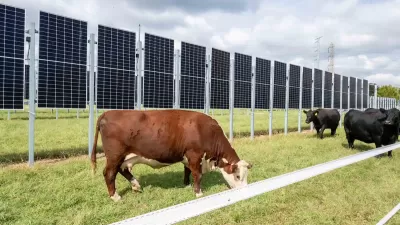In most states, solar companies are required to provide an end-to-end plan for solar power installations.

In an article for Inside Climate News, Dan Gearino describes a new report from NC Clean Energy Technology Center, “50 States of Solar Decommissioning,” which reviews state and local laws regarding how solar installations are managed after they are no longer in service.
According to the report, solar farms are generally built to last roughly 30 years. “Decommissioning a solar farm involves removing the panels, racks, wires and other equipment and taking actions to restore the ground to its previous state. The company doing the removal will sell much of the scrap to recyclers.” Land can usually be returned to agricultural or other uses. “In most places, developers must submit a plan for removal of the projects and take steps to guarantee that local communities will have minimal, if any, costs.”
Gearino adds, “As of the end of 2023, 20 states (including Texas) had statewide policies, and nine states (including California) had a hybrid of state and local rules” that regulate how solar farms are decommissioned.
FULL STORY: Who Pays for Cleanup When a Solar Project Reaches the End of Its Life?

Maui's Vacation Rental Debate Turns Ugly
Verbal attacks, misinformation campaigns and fistfights plague a high-stakes debate to convert thousands of vacation rentals into long-term housing.

Planetizen Federal Action Tracker
A weekly monitor of how Trump’s orders and actions are impacting planners and planning in America.

Chicago’s Ghost Rails
Just beneath the surface of the modern city lie the remnants of its expansive early 20th-century streetcar system.

Bend, Oregon Zoning Reforms Prioritize Small-Scale Housing
The city altered its zoning code to allow multi-family housing and eliminated parking mandates citywide.

Amtrak Cutting Jobs, Funding to High-Speed Rail
The agency plans to cut 10 percent of its workforce and has confirmed it will not fund new high-speed rail projects.

LA Denies Basic Services to Unhoused Residents
The city has repeatedly failed to respond to requests for trash pickup at encampment sites, and eliminated a program that provided mobile showers and toilets.
Urban Design for Planners 1: Software Tools
This six-course series explores essential urban design concepts using open source software and equips planners with the tools they need to participate fully in the urban design process.
Planning for Universal Design
Learn the tools for implementing Universal Design in planning regulations.
planning NEXT
Appalachian Highlands Housing Partners
Mpact (founded as Rail~Volution)
City of Camden Redevelopment Agency
City of Astoria
City of Portland
City of Laramie





























